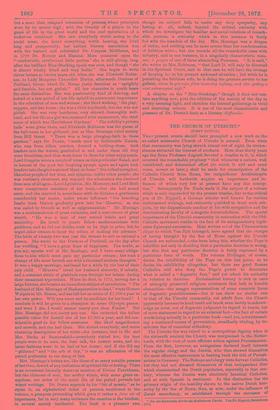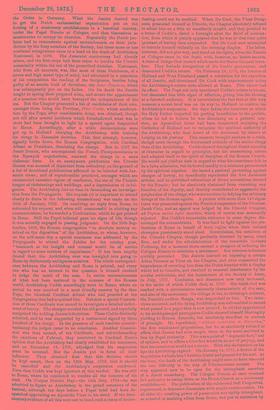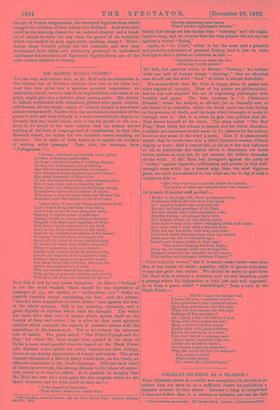THE CHURCH OF UTRECHT.* [FIRST NOTICE.]
THAT present events should have prompted a new work on the so-called schismatic Church of Utrecht is natural. Even when that community was lying shrank almost out of sight, its circum- stances attracted the interest of students. More than thirty years ago the Bonn Professor Augusti devoted a treatise to it, in which occurred the remarkable prophecy "that whenever a serious, well considered, and determined effort (to which it will and must come, sooner or later,) shall be made for emancipation of the Catholic Church from Rome, the insignificant Archbishopric of Utrecht will forthwith acquire an importance and in- fluence of which very few at present have any due concep- tion." Subsequently Dr. Neale made it the subject of a volume which is only superseded by the present treatise, due to the critical pen of Dr. Nippold, a German scholar well known for various ecclesiastical writings, and eminently qualified to treat such sub- jects, by the dispassionate candour of his wide sympathies and the discriminating faculty of a singular fairmindedness. The special importance of the Utrecht community in connection with the Old- Catholic movement resides in the fact of its unimpeachably legiti- mate Episcopal succession. Most writers not of the Ultramontane clique to which Van Ryk belonged, have agreed that the charges of heresy brought by the See of Rome against the Utrecht Church are unfounded, —the issue being this, whether the Pope is infallible not only in deciding that a particular doctrine is wrong, but also that any particular doctrine is fairly expressed by a particular form of words. The veteran Dollinger, of course, denies the infallibility of the Pope on this last point, as he denies his infallibility altogether, but there are good Roman Catholics still who deny the Pope's power to determine what is called a "dogmatic fact," and yet admit his authority in relation to doctrine. Ecclesiastical history is rich in cases of strangely preserved religious existences that lurk in humble obscurities—the meagre representatives of some eccentric forms of dogmatic punctiliousness—but it can show no similar case to that of the Utrecht community, cut adrift from the Church apparently because its head could not brook even tacitly to acknow- ledge an error, not of dogmatic judgment in regard to tenets, but of mere statement in regard to an external fact—the fact of certain words being actually in a particular book—and yet, notwithstand- ing a continued course of provocation, steadfastly abiding by the strictest line of canonical orthodoxy.
The Utrecht See was raised to a metropolitan dignity when in the sixteenth century the Church was reorganised in the Nether- lands, with the view of more efficient action against Protestantism. From the first, however, an antagonism declared itself between the regular clergy and the Jesuits, who then showed themselves the most effective instruments in beating back the tide of Protest- antism in Germany. The Bishops and clergy were fervent Catholics, but they had not divested themselves of that independent fibre which characterised the Dutch population, especially in that cen- tury, whereas the Jesuits were absolutely fanatical Catholics, and as such Spanish in sentiment. In this distinction lies the primary origin of the hostility shown to the native Dutch hier- archy by the See of Rome, then, as now, under the influence of Jesuit ascendancy, as established through the successes of • Die dit-Kaiholieche Eirche des Erxbisihums Utrecht. Von Fr.Nippold, Heidelberg.- 1872.
the Order in Germany. What the Jesuits desired was to get the Dutch ecclesiastical organization put on the footing of a missionary establishment in a heretical country, tinder the Papal Nuncio at Cologne, and then themselves as missionaries to occupy its churches. Repeatedly the Dutch pre- lates had to remonstrate against encroachments on their juris- diction by the busy members of the Society, but these more or less continual antagonisms came to a head on the death of Archbishop Neercassel, in 1686. The Jansenist controversy had already arisen, and the first steps had been taken to involve the Utrecht community within the net of the proscribed doctrine. Neercassel, who from all accounts, was, like most of these Dutchmen, of a -severe and high moral type of mind, had advocated in a catechism of his composition the reading of the Scriptures, besides being guilty of an ascetic book of devotions, the Amor Pznitens, which was subsequently put on the Index. On his death the Jesuits sought to spring their prepared mine, and secure the appointment of a nominee who would have betrayed the independence of the see. But the Chapter presented a list of candidates of their own, amongst them being the Provicar, Peter Codde, whose confirma- tion by the Pope, after considerable delay, was obtained, though not till after several incidents which foreshadowed what was in store had been brought to light by a special agent despatched to Rome. Accordingly, after a while denunciations were got up in Holland charging the Archbishop with training his clergy in Jansenist doctrine. This first attempt, however, signally broke down, the Roman Congregation, with Cardinal Albani as President, dismissing the charge. But in 1697 the -Jesuit Doucin, who accompanied the French Plenipotentiaries to the Ryswyck negotiations, renewed the charge in a more -elaborate form. In an anonymous publication the Utrecht diocese was accused of departure from orthodoxy, on the ground of a list of devotional publications affirmed to be infected with Jan- senist views ; and of reprehensible practices, amongst which are enumerated excessive rigour of confession, the use of the Flemish tongue at christenings and weddings, and a depreciation of indul- gences. The Archbishop lost no time in demanding an investiga- tion from the Propaganda. His request (it is important to attend closely to dates in the following transactions) was made on the 24th of January, 1698. On receiving no reply from Rome, he reiterated his request, and when still unsuccessful in eliciting any communication, he forwarded a Confutation, which he got printed in Rome. Still the Papal tribunal gave no signs of life, though it was actually engaged in passing judgment. On the 25th Sep- tember, 1699, the Roman congregation " in absolute secrecy re- solved on the deposition" of the Archbishop, to whom, however, on the self-same day a special summons was addressed by the Propaganda to attend the Jubilee for the coming year, " inasmuch as his insight and counsel would be of service in regard to some matters of importance." It has been angrily denied that the Archbishop ever was inveigled into going to Rome by deliberately ambiguous missives. The whole correspond- ence between the Archbishop and Rome is printed, and every one who has an interest in the question is himself enabled to judge the merit of the case. In entire unconsciousness of what had been matured in the recesses of the Roman world, Archbishop Codde accordingly went to Rome, where on arrival he was received in a most friendly manner by the then Pope, the identical Cardinal Albani who had presided at the Congregation that had acquitted him. But soon a special Commis- sion of three Cardinals was named to investigate a detailed indict- ment of heresy. The charges covered the old ground, and especially comprised the holding Jansen's doctrines. These Codde distinctly rebutted, and he was supported by a testimonial signed by three hundred of his clergy. In the presence of such resolute counter- testimony the judges came to no conclusion. Another Commis- sion was then named, of ten Cardinals, and notwithstanding the exertions of Fabroni, they 'concurred in Cardinal Noris's opinion that the Archbishop had clearly established his innocence, and on December 18, 1701, adjudged that his suspension must be reversed. But the Jesuits put in force all their influence. They obtained first that this decision should be kept secret, then on the 13th May, 1702, that it should be cancelled and the Archbishop's suspension confirmed. Even then Codde was kept ignorant of this verdict. He was still in Rome, where he continued to receive all the honours of his rank. On Corpus Domini Day—the 15th July, 1702—he was admitted to figure as Archbishop in the grand ceremony of the festival, although ten days before a Papal brief bad been de- spatched appointing an Apostolic Vicar in his stead. If the docu- mentary evidence of all this were not to hand, such a tissue of double-
dealing could not be credited. When De Cock, the Vicar Desig- nate, presented himself at Utrecht, the Chapter absolutely refused to admit him on a title so manifestly invalid, and they pointed to a letter of Codde'a, dated a fortnight after the Brief of nomina- tion, from which it plainly appeared that be was at that time quite ignorant of having been suspended. But De Cock now attempted to intrude himself violently on the resisting chapter. The latter, however, did not give way, and stood on its rights, when the Nuncio at Cologne came to the front, with, however, no better success. A state of things thus ensued which made the States-General inter- fere. They forbade recognition of De Cock's pretensions, and demanded Codde's return. On February 24, 1703, the Estates of Holland and West Friesland passed a resolution for the expulsion of all Jesuits, and threatened De Cock with imprisonment unless the Archbishop's return were allowed at Rome. This threat had its effect. The Pope not only sanctioned Codde's return to his see, but dismissed him with signs of affection, giving him his blessing at a farewell audience. It is nevertheless the fact that at this very moment a secret brief was on its way to Holland to confirm the Archbishop's suspension. Six days before the interview at which the Holy Father imparted his parting benediction to the prelate, whom he led to believe he was dismissing on a pastoral mis- sion, an Apostolical letter had been despatched enjoining the Catholics of Holland not to recognise the spiritual authority of the Archbishop, who first heard of the document by chance at Leipzig on his journey. This measure brought matters to a crisis, though more through the determined attitude of the native clergy than of the Archbishop. Codde showed throughout Dutch tenacity of character in regard to principles, but his unassuming nature had adapted itself to the spirit of discipline of the Roman Church. He would not yield an inch in regard to what his conscience felt to be a false admission, but he bowed meekly to a sentence pronounced by his spiritual superior. He issued a pastoral protesting against charges of heresy, he specifically repudiated the five Jansenist articles, and he published refutations of divers accusations uttered by the Nuncio ; but he absolutely abstained from exercising any function of his dignity, and thereby contributed to aggravate the perplexities of the clergy, who were resolute in defying the arbitrary doings of the Roman agents. A protest with more than 140 signa- tures was presented against the Nuncio's suspension of the Provicar, Jacob Catz, and an appeal was lodged by the Utrecht Chapter, ad Papam melius infor mandum, which of course was summarily rejected. But Codde's immovable reticence in some degree dis- couraged the remonstrants. It was hard to fight against the pre- tensions of Rome in behalf of local rights when their natural champion persistently stood aloof. Nevertheless, the members of the Utrecht Chapter, though gradually deserted by many, stood firm, and under the administration of the venerable Gerhard Potkamp, for a moment there seemed a prospect of inducing the Cologne Nuncio to entertain a settlement. But extreme influences quickly prevailed. The Jesuits insisted on imposing a certain Adam Daemen as Vicar on the Chapter, and even committed the imprudence of escorting him from the Dutch frontier with a display which led to tumults, and resulted in renewed interference by the secular authorities, and the banishment of the Society of Jesus, in July, 1707. Confusion and dissension now only increased, in the midst of which Codde died, in 1710. His death-bed was marked with a circumstance eminently characteristic of the man, and also of the movement. On tidings of the Archbishop's sickness, the Nuncio's auditor, Borgia, was despatched to him. Two inter- views occurred, and the dying Archbishop was still enabled to record what passed in a paper that is now printed. In all that appertained to his archiepiscopal prerogative Codde showed himself thoroughly yielding to Roman demands, but absolutely steadfast in matters of principle. He repudiated, " without restriction or distinction," the five condemned propositions, but he as absolutely refused to affirm that Jansen bad ever taught them in the sense ascribed to him by Papal authority. This was a point of " dogmatic fact," not of opinion, and to affirm a false fact would be an act of perjury, and that his conscience would not tolerate. With this declaration on his lips the Archbishop expired. On January 14, 1711, a decree of the Inquisition forbade him Christian burial and prayers for his soul. At the time, the death of the Archbishop might seem to have removed the one difficulty in the way of Ultramontane success. The way appeared now to be open for the triumphant assertion of a Jesuit ascendancy. The Cologne Nuncio at once assumed full authority to sweep down on the Dutch Church as a missionary establishment. The publication of the celebrated Bull Unigenitus, supervened, to denounce Jansenism with ampler condemnation. On all sides the crushing power of persecution was visibly triumphant, as attested in scathing edicts from Rome, and put in execution by
the 'aid of French dragonnades, the wretched fugitives from which brought the evidence of their misery into Holland. And what then could be the seeming chance for an isolated chapter and a hand- ful of priests to resist for any term the power of an authority which was backed by such apparently crushing means? Never- theless these Utrecht priests did not succumb, and how they maintained their rights and ultimately preserved in undoubted legitimacy the succession of Episcopal dignity forms one of the most curious chapters in history.




































 Previous page
Previous page